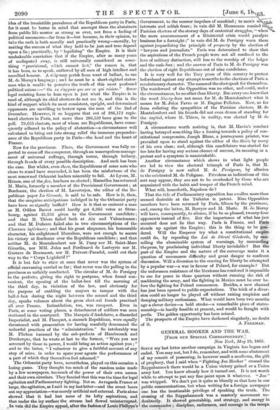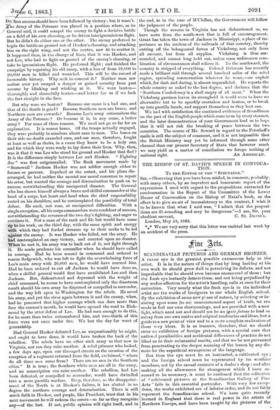GENERAL HOOKER AND THE WAR.
[FROM OUR SPECIAL CORRESPONDENT.]
New York, May 19, 1863. SINCE my last letter another campaign in Virginia has begun and ended. You may not, but I do, remember, and with some abatement of my conceit of possessing, in however small a modicum, the gift of prophecy, that I said when "Fighting Joe Hooker" crossed the Rappahannock there would be a Union victory gained or a Union army lost. You know already how it turned out. It is not worth while to attempt to put any fine point upon it whatever. " Joe " was whipped. We don't put it quite so bluntly as that here in our public communications, but when writing for a foreign newspaper one has the inestimable privilege of speaking the truth. The crossing of the Rappahannock was a masterly movement un- doubtedly. It showed generalship, and strategy, and energy in the commander ; discipline, endurance, and courage in the troops.
ItWfirst success should have been followed by victory; but it wasn't. ;rho Army of the Potomac was placed in a position where, as its / General said, it could compel the enemy to fight a decisive battle on a field of his own choosing, or be driven into ignominious flight. But he didn't do either one or the other. The enemy preferred to begin the battle on ground not of Hooker's choosing, and attacking him on the right wing, and not the centre, saw fit to scatter it. It happened then, in the change of lines, that it was Hooker, and not Lee, who had to fight on ground of the enemy's choosing, or take to ignominious flight. He preferred flight ; and finished the campaign by regaining his old camp, with a loss of from 18,000 to 20,000 men in killed and wounded. This will be the record of inexorable history. Why seek to conceal it? Neither man nor nation ever yet escaped a danger or gained security from past reverse by blinking and winking at it. We were beaten— thoroughly and shamefully beaten—and better for us if we look the fact straight in the face.
But why were we beaten? Because our cause is a bad one, and that of the South is good? Because Southern men are brave, and Northern men are cowards? Because Lee's army outnumbers the Army of the Potomac? Or because it is, in any sense, a better army? For none of these reasons. We need not go so far for an explanation. It is nearer home. Of the troops actually engaged, they were probably in numbers about man to man. The losses on their side no doubt exceeded ours, and our men, therefore, fought at least as well as theirs, in a cause they know to be a holy one, and for which they were ready to lay down their lives. Why, then, was it that it was Lee who stood his ground and Hooker that fled ? It is the difference simply between Lee and Hooker. "Fighting Joe" was first outgeneralled. The flank movement made by " Stonewall " Jackson Hooker was not soldier enough either to foresee or prevent. Repulsed at the outset, and his plans dis- arranged, he had neither the mental nor moral resources to repair his error, but wanted the courage and determination to push on to success, notwithstanding this unexpected disaster. The General who has shown himself always a brave and skilful commander at the head of a corps, lost heart and head when the chief responsibility rested on his shoulders, and he contemplated the possibility of total defeat. He sunk, not rose, at unexpected difficulties. With a single exception, all his corps commanders were confident of success, notwithstanding the reverses of the two day's fighting, and eager to continue it. Not a man of the rank and file but would have come up to his work, on the third day, with the same spirit and energy with which they had forded streams up to their necks to be led against the enemy. It was Hooker who failed, not the army. He had contemplated an easy victory, and counted upon no disaster. When he met it, his army was to back out of it, not fight through it. He made prudence his counsellor when he should have called in courage. Had he been second in command and ordered to rescue Sedgewick, who was left to fight the overwhelming force of Lee's main army with 20,000 men, he would have rescued him. Had be been ordered to cut off Jackson he would have done so, when a skilful general would first have annihilated Lee and then Jackson. But, disheartened and depressed with the weight of chief command, he seems to have contemplated only the disastrous result should his own army be dispersed or compelled to surrender, and the way left open to Washington for the rebels. He saved his army, and put the river again between it and the enemy, when, had he possessed that higher courage which can dare more than face the cannon's mouth, he would have opened the road to Rich- mond by the utter defeat of Lee. He had men enough to do this, for he more than twice outnumbered him, and two-thirds of this force were not once under fire. We lost the day for want of generalship.
Had General Hooker defeated Lee, as unquestionably he might, and ought to have done, it would have broken the back of the rebellion. The rebels have no other such army as that now in Virginia, nor can they raise another. A rebel prisoner who looked, a few days ago, upon our thronged streets on the occasion of the reception of a regiment returned from the field, exclaimed, "where do all these men come from? There are no men in the Southern cities." It is true ; the Southern white men are all in the army, and no conscription can raise another. The rebellion, had Lee been defeated, or compelled to surrender, would have dwindled into a mere guerilla warfare. Deep, therefore, as the disappoint- meat of the North is at Hooker's failure, it has abated in no degree the northern courage and determination. There is still much faith in Hooker, and people, like President, trust that in his next movement he will redeem the errors—so far as they recognize any—of the last. If not, public opinion will right itself, and in
the end, as in the case of M'Clellan, the Government will follow the judgment of the people.
Though the reverse in Virginia has not disheartened us, we have news from the south-west that is full of encouragement. Grant has taken the town of Jackson in Mississippi, a place of im- portance as the nucleus of the railroads of that country, thereby cutting off the beleaguered forces of Vicksburg, not only from all succour, but from all supplies. Vicksburg is thus sur- rounded, and cannot long bold out, unless some unforeseen com- bination of circumstances shall relieve it. To the southward, the country is stripped of everything. Colonel Grierson has recently made a brilliant raid through several hundred miles of the rebel region, spreading consternation wherever he went,—an exploit which, for dash and daring, is almost unparalleled. He reports the whole country as naked to the last degree, and declares that the "Southern Confederacy is a shell empty of all meat." When the Vicksburg garrison leaves its stronghold it would seem to have no alternative but to be speedily overtaken and beaten, or to break up into guerilla bands, and support themselves as they best can.
We bail with satisfaction the continued evidences of friendliness on the part of the English people which come to us by every steamer, and the later demonstrations of your Government lead us to hope that it will not risk the breaking of peace between the two countries. The course of Mr. Seward in regard to the Peterhoff's mails is still the subject of comment, and it is not impossible that the British Ministry may yet be informed through some other channel than our present Secretary of State that however much we may yield as a matter of conciliation we forego nothing of































 Previous page
Previous page